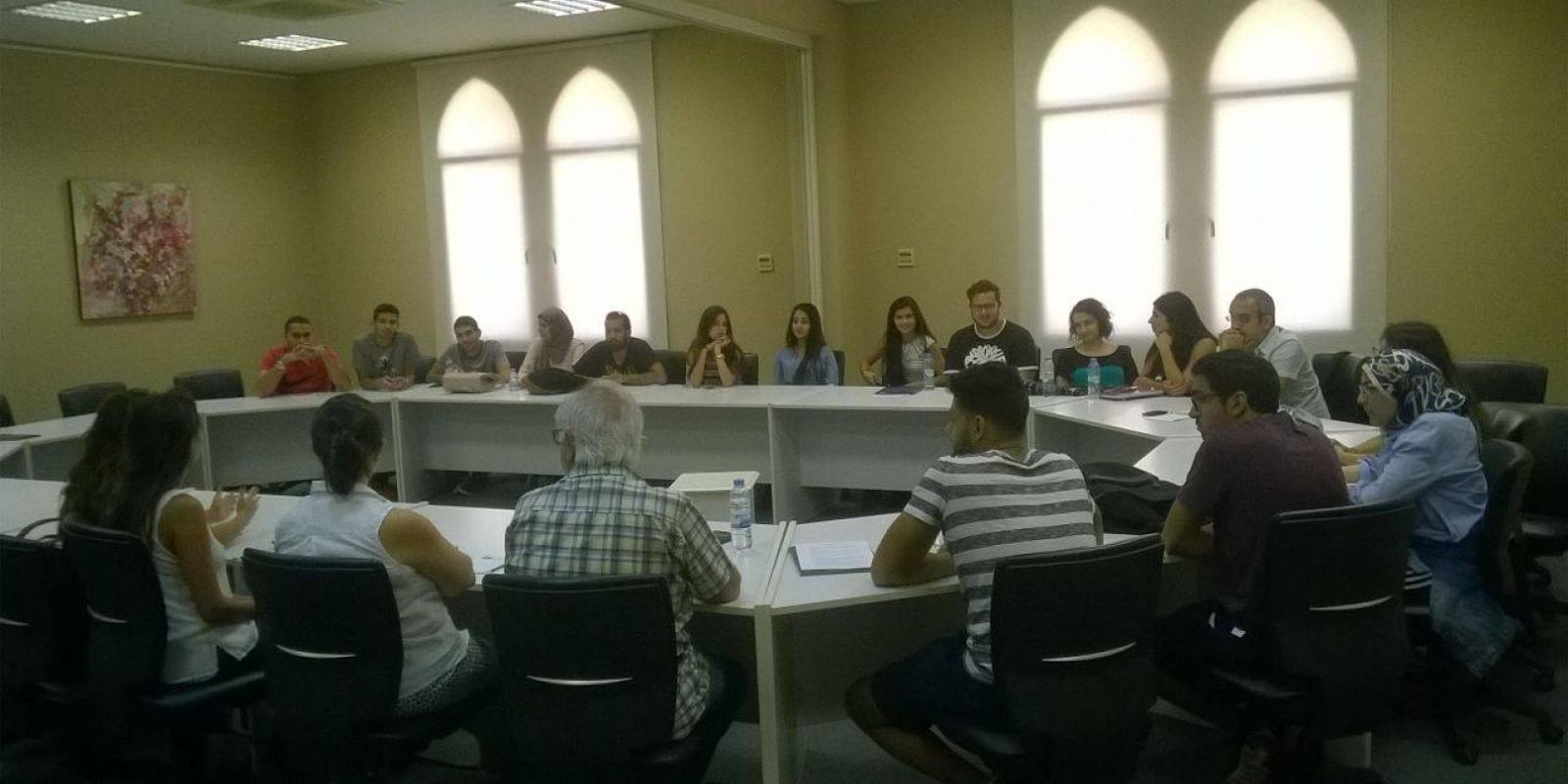
AUC Summer Class Visits Lebanon, Engages in Dialogue with AUB Peers
This summer, AUC students traveled to Beirut, Lebanon as part of a new course titled, The Arab Spring in Arab Eyes: Perceptions and Reflections from the Arab World. Through this course, the students were able to participate in face-to-face dialogue with their counterparts from the American University of Beirut (AUB), discussing social and political movements in the Arab region as a result of the Arab Spring, in addition to visiting NGOs, historic sites and refugee camps.
“Merging the extracurricular with the academic and learning-by-doing is extremely beneficial to students,” said Mohamed Menza, affiliate assistant professor and director of dialogue in the Office of the Core Curriculum. “It allows them to get to know what is happening on the ground and augments their understanding of the region. This type of course is particularly beneficial to Egyptian students at AUC, as this kind of exposure enhances students’ knowledge about themselves and Egypt as a part of the Arab region. They can expose themselves to other viewpoints and other students’ realities.”
Learning-by-Doing
This multidisciplinary course prompts students to consider the social, economic, political and cultural contexts of Arab world movements. Prior to traveling, students participated in eight in-class sessions at AUC, where they engaged in various readings together to gain the necessary background knowledge before meeting with their AUB counterparts.
“The sessions [at AUC and in Lebanon] were very diverse because we all came from different academic backgrounds such as engineering, marketing and communications, economics, political science and nursing,” reflected alumna Youmna ElSherbiny ‘16, who participated in the course this summer as an auditor, taking part in a designated set of activities. “It made the talk more enriching and cohesive.”
Once in Beirut, joint lectures and discussions were co-facilitated by Menza and his counterpart AUB professor Rima Majed. Menza also partnered with Professor Sami Ofeish of Balamand University in order to organize a dialogue with students as part of the sites visits conducted outside of AUB. Additionally, students traveled to Tripoli in North Lebanon, guided through a tour of the city’s old port and low-income communities. They also had the opportunity to visit several civil society entities, the Shatila Palestinian refugee camp and Najdeh NGO. Additionally, they met with employees from SAW NGO, an organization working with Syrian Refugees in the area of El-Beqaa, and Lebanese Civil War veterans who now promote nonviolence. “It was so enriching to listen to ex-fighters and learn how they are now directing all their efforts toward becoming peacemakers,” said ElSherbiny.
For Mahi Kurdi, a graduating senior majoring in music performance (piano) and studying the pre-medical track at AUC, the course was resourceful in many ways. “I had visited Lebanon lots of times before, but this time was remarkably different, as we visited refugee camps, northern Lebanon and the University of Balamand, and also had the chance to talk to representatives from several NGOs,” she said. “Almost all of us as AUCians had not known each other before we took the class, but the trip drew us much closer to each other and proved to me that no matter how different a group of strangers are, they will eventually form a very good bond if they are put in a situation where they have to live together. This is exactly what happened with us. This cross-cultural experience not only got us to integrate with the Lebanese community, but also to form stronger and intimate friendships between us as AUCians.”
Core Curriculum Dialogue Project
Open to AUC students from all disciplines, this pilot exchange course has been introduced by the Office of the Core Curriculum this semester as a summer version of a similar course typically offered during the academic year. The course is part of the Office of the Core Curriculum’s Dialogue Project, which has been in operation for more than 15 years. The project was informally launched following the events of September 11, 2001 in the hopes of furthering AUC’s mission as a liberal arts institution and promoting dialogue between AUC students and students of diverse backgrounds. “We can never undermine the essence and significance of dialogue and ‘responsive understanding,’” said Menza, who has written extensively on cross-cultural pedagogical exchange, basing his conceptions of dialogue on the concept of “responsive understanding” the goal of dialogue, according to philosopher and scholar Mikhail Bakhtin.
The Core Curriculum’s Dialogue Project gradually grew, and the project has sponsored a number of courses over the years, featuring different dialogue activities. In addition to The Arab Spring in Arab Eyes, the project has offered courses titled Arab and American Identities in Tension as well as South-South Dialogue.
Throughout the year, the Core Curriculum offered The Arab Spring in Arab Eyes as a capstone-level Core Curriculum course, exposing AUC students to cross-cultural dialogue through video conferencing tools. Occasionally, the course witnessed visitors from other universities, but there was no fixed counterpart associated with the class as there was during the summer. The summer version presented a unique opportunity for students to extend their thinking beyond the classroom experience, directly interacting with students as they shared reflections and getting the chance to make observations in another country.
“This kind of face-to-face interaction allows students to capitalize on the cross-cultural experience and take dialogue to a higher level,” said Menza.
